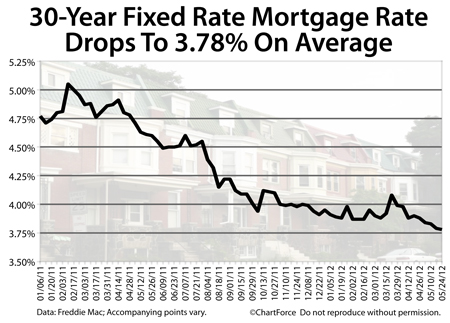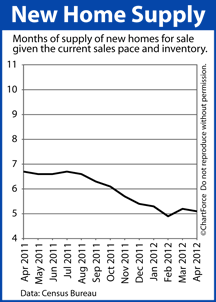 Mortgage markets worsened slightly last week as demand for mortgage-backed bonds slacked. There was little surprise in U.S. economic data and the unfolding story lines of the Eurozone continued unabated.
Mortgage markets worsened slightly last week as demand for mortgage-backed bonds slacked. There was little surprise in U.S. economic data and the unfolding story lines of the Eurozone continued unabated.
Mortgage rates in Kentucky worsened slightly on the news, climbing for the first time in two weeks.
The change was a small one, however, and rates only eased higher Wednesday through Friday. As such, Freddie Mac’s weekly mortgage rate survey failed to capture the change — Freddie Mac’s survey is conducted Monday and Tuesday.
According to the Primary Mortgage Market Survey, the average 30-year fixed rate mortgage rate slipped to 3.78% last week, on average, down from 3.79% during the week prior. At the same time, the number of discount points charged by banks increased to 0.8 from 0.7.
Stated differently, 30-year fixed rates mortgage rates dropped but mortgage applicants paid higher fees to get access to them. 1 discount point is equal to $1,000 per $100,000 borrowed.
Freddie Mac also reported no change in the 15-year fixed rate and the 5-year adjustable rate mortgage rates. Average mortgage rates for the twp benchmark products remained at 3.04% and 2.83%, respectively, with no change in discount points.
This week, mortgage rates figure to show a bit more movement. It’s a 4-day week because markets were closed for Memorial Day, and there is a glut of new data set for release. Most notably, the May Non-Farm Payrolls report hits Friday morning.
The jobs report affects mortgage rates because mortgage rates are linked to U.S. economic strength. Wall Street is expecting to see 164,000 net new jobs created in May. If the actual results fall short of that estimate, mortgage rates should fall. If the actual number exceeds estimates, mortgage rates should rise.
Other releases include the Case-Shiller Index, Consumer Confidence, the Pending Home Sales Index, and Personal Income and Outlays.

 The April New Home Sales report suggests that the market for newly-built homes is as strong as the market for existing ones.
The April New Home Sales report suggests that the market for newly-built homes is as strong as the market for existing ones. 